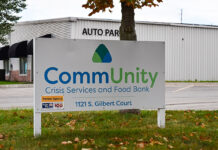Target is opening smaller-format stores at a rapid pace, including this one in Minneapolis’ Uptown district. The “campus store” in Iowa City will span about 24,000 square feet — about 100,000 square feet less than the average full-size target. PHOTO TARGET
By Katharine Carlon
[email protected]
Bigger is not necessarily better in retail these days, which helps explain Target’s strategy of rolling out smaller-format stores over the next year – including one in downtown Iowa City.
The Minneapolis-based company announced last week it has signed a lease to open a small-format “campus store” at 115 E. Washington St., in the former Brown Bottle space that once housed Younker’s department store for about 40 years.
The 24,000-square-foot-location will join about 100 other small-scale stores built in urban and college areas since the concept was first tested in 2012. These smaller stores make up the vast bulk of the stores Target plans to open in 2019.
“Across the country, Target has prioritized opening small-format stores to serve guests in urban areas, dense suburban neighborhoods and near college campuses – places where a full-size Target typically wouldn’t fit,” a company spokeswoman said, adding the downtown Iowa City location would offer an “easy, convenient shopping experience” to the community, one tailored to match the needs of local residents.
The new Iowa City Target appears on a list of upcoming openings on the company’s official website, although no date is specified. Of the 36 Target stores set to open in 2019, 2020 and beyond, only one in Los Angeles approaches the average full-format Target size of 130,000 square feet.
Averaging about 40,000 square feet, the small-format stores pack a greater impact, pound for pound, than their full-size cousins, generating higher-than-company average sales activity, according to the company. That suggests customers are shopping more frequently, despite smaller basket sizes.
“In 2017, we made a big bet on putting our stores at the center of how we serve our guests,” said Target CEO John Mulligan in a release. “Fast forward to today, and our investments in small formats and remodels have allowed us to reach more guests than ever before with an easy and inspiring shopping experience, while offering industry-leading same-day services like Order Pickup and Drive Up around the country.”
Target is not alone in thinking smaller. Walmart, Staples, Best Buy and other retailers have also focused on smaller-footprint stores in recent years. Even Ikea, known for its cavernous, maze-like warehouses, is experimenting with a new “planning studio” model where shoppers can order the full array of products and have them home-delivered.
A recent study by Koupon Media found that small-format retail categories outgrew larger format stores by almost 400 percent in 2016, and now represents a $1 trillion-plus market. The study attributed the shift to demographic changes – namely the fact that nearly 85 percent of Americans live in urban areas – and the rise of online shopping. Shopping trips with less frequency and higher basket sizes are more conducive to online shopping, leaving a niche for stores offering immediate and on-the-go purchases.
Time is also a factor in the rise of small-format stores, according to the study. The average trip to a small-format store is under 4 minutes, versus 38 minutes at large format stores.
Since first testing the small-format concept, Target has developed an approach to localize assortments and design features that make sense for the neighborhoods in which they open. It has also made changes to its supply chain to ensure the smaller stores are well-stocked, despite a lack of backroom space for inventory. Strategies for working around those spatial constrains include more frequent deliveries, smaller trucks and careful planning.
In Iowa City, renovations are already underway to prepare for Target to take over the space, Iowa City Economic Development Coordinator Wendy Ford said, adding that the city was not involved in luring the retailer to the downtown location. The property is owned by Joe Clark and Kevin Monson, who acquired it from MidWestOne Bank earlier this year.
“The owners reached out themselves and got the attention of Target executives,” Ms. Ford said. “It meshed well with Target’s plans to open these small-format stores in college markets.”
Target opened 10 new small-format stores on or near college campuses last year, and operate about 27 “campus stores” nationwide, according to the company’s corporate website. That includes other Big 10 cities such as Columbus, East Lansing, Evanston and Minneapolis.
Campus stores are specially curated to serve students and staff, in addition to residents of the surrounding community. That typically means carrying an assortment of grab-and-go lunch and snack items, toiletry essentials, dorm décor and apparel, school supplies, and tech accessories. The stores also offer longtime Target brands.
“We think this is a good thing since we have more and more people living downtown, so that’s a very good reason for another retailer,” Ms. Ford said. “We also think the draw of a [general merchandise] retailer such as this will bring more people downtown than would otherwise come, and more people on the street is good for all retailers.” CBJ




